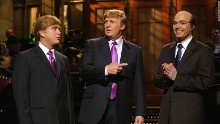What repulsive swastika retweet tells us about Trump
On Tuesday, Donald Trump, who would like to be our President, retweeted a message about Jeb Bush. It featured a swastika among its gallery of Bush-bashing images. And with this tweet, Trump has outdone himself in doing whatever he can to stay in the headlines through sensationalist attacks on his rivals.

Ruth Ben-Ghiat
He has mocked candidate Bush before on the grounds of patriotism, painting him as somehow less American because he speaks Spanish at home and when addressing Hispanic audiences. This time, perhaps worried about his declining status after his uneven performance in the last GOP candidates' debate, Trump went for the sure shot on social media, and included the most recognizable symbol of Nazism.
As offensive as this montage is, we can be thankful that he posted it. Images have their own way of telling stories. They are often used in political propaganda to elicit a visceral reaction -- outrage, laughter, identification -- and they reveal things their creators are not able or willing to say with words.
A grouping of images, intended to spark certain associations, is even more useful in reading how someone thinks about a given person or subject.
So what can we learn from these pictures that can be useful in evaluating him as a potential president? First, the depth of his attachment to a politics of prejudice that disdains and distrusts all those who are not white and of European Christian heritage.
In the logic of Trumpworld, Jeb Bush is a straw man -- he even wears a sombrero, in one image -- for all Americans who are soft on immigration and thus soft in body and character. Bush is "Forrest Bush," as another image proclaims, a weak and backward man who will leave our country unprotected for "animals" to come through (one of the cartoons in the assemblage shows a strange, monkey-like creature featured breaching our borders).
Hate politics, from Nazism onward, thrive on paranoia. In Trump's hands, Jeb Bush becomes that stock figure of propaganda, the internal enemy who masquerades as a patriot but whose interests are really against the nation. Trump's tabloid-style graphics to associate Bush with foreigners (his Mexican-born wife occupies a central place in the gallery), with "the Bush criminal family" and their campaign to reclaim, through Bush, a ruined empire (cue the image of a broken crown).
And here we come to the swastika, which is on a flag that comes out of the barrel of a gun, flanked by portraits of Jeb Bush and his "criminal" family. "Evil Runs Deep," the lurid font proclaims. This image is so exaggerated as to become parody. But the use of the gun, together with the swastika, also contains a reveal about which Americans Trump aims to please with his platform.
For the swastika is not a dead symbol, but one used -- sometimes together with the Confederate flag -- by American white supremacists. Featuring a swastika and a gun on American social media just months after the Charleston church massacre -- in which Dylann Roof (shown in pictures displaying the Confederate flag) slaughtered nine people in a black church -- sends a message to those who want to hear it: Trump is not only anti-immigrant, but pro-white.
In fact, one could conclude that Trump's relentless insults of Jeb Bush, and his depiction of Bush as a stereotypical Mexican -- witness the image of Bush playing the guitar, against a landscape of cacti, wearing a sombrero -- are a means of attacking some of his other Republican presidential rivals, who actually are Hispanic, and who are actually political threats to him: the Cuban-Americans Ted Cruz and Marco Rubio.
And that, too, is a classic operation of political propaganda, as perfected by the Nazis: Make one group, or person, stand in for the perceived faults of others. This latest retweet may remind us of Trump's mastery of social media, but his crude gallery of images is proof of his unworthiness of the presidency.
News Courtesy: www.cnn.com











